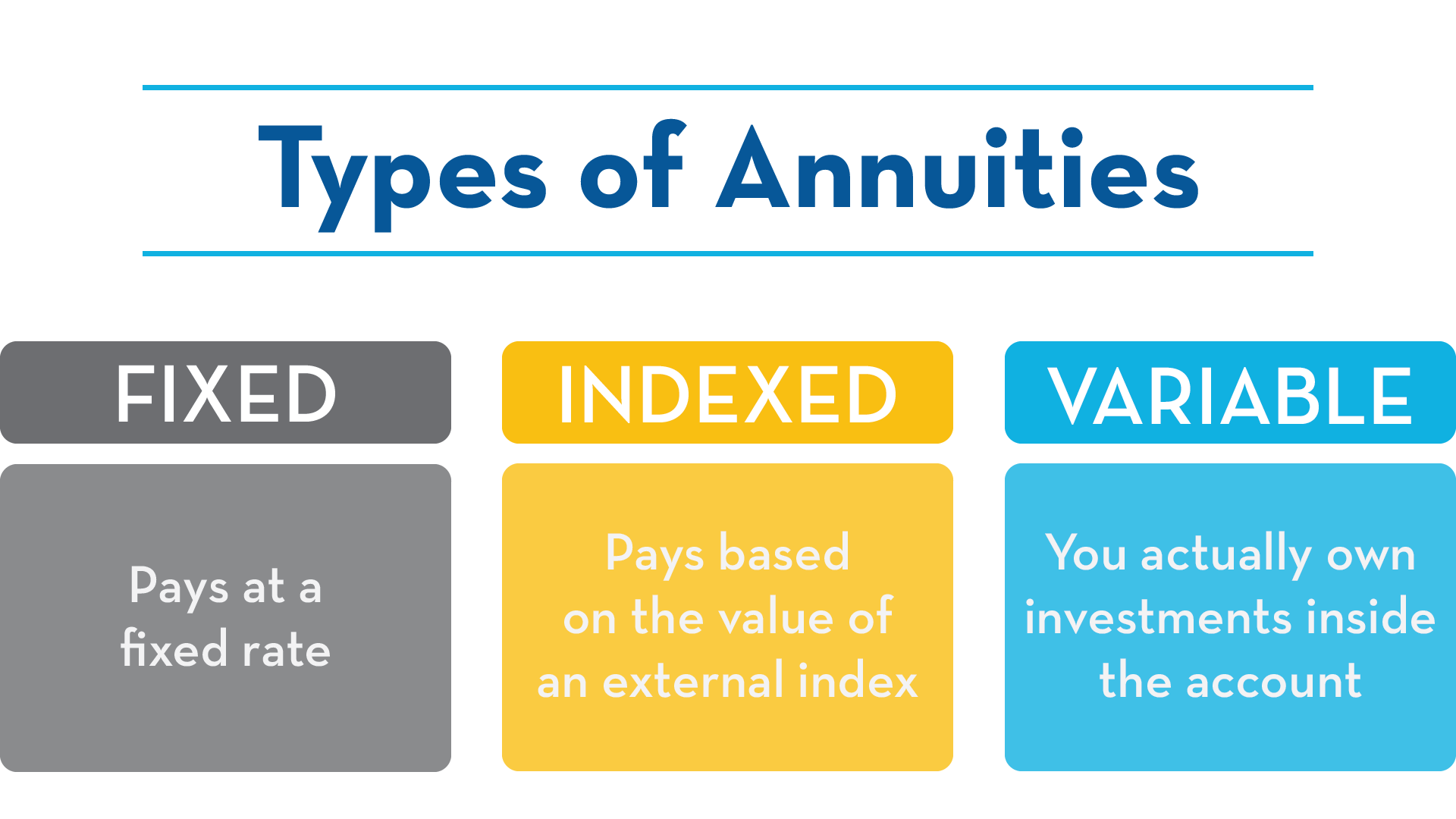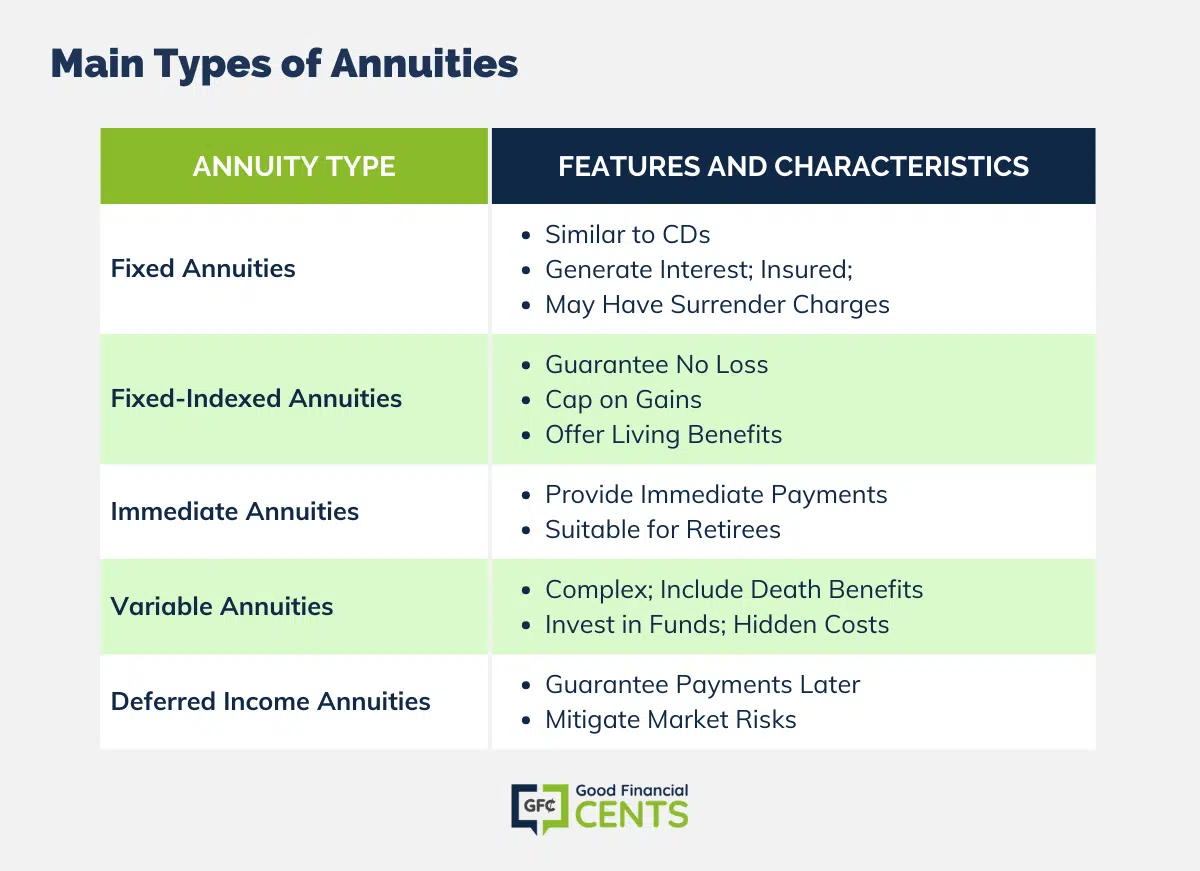All Categories
Featured
Table of Contents
There are 3 sorts of annuities: dealt with, variable and indexed. With a fixed annuity, the insurer guarantees both the price of return (the rate of interest rate) and the payout to the capitalist. The rate of interest on a repaired annuity can transform gradually. Frequently the rate of interest rate is repaired for a number of years and afterwards adjustments regularly based upon existing prices.
With a deferred set annuity, the insurer accepts pay you no much less than a defined price of rate of interest during the time that your account is growing. With a prompt fixed annuityor when you "annuitize" your delayed annuityyou receive an established set quantity of cash, usually on a month-to-month basis (similar to a pension).
While a variable annuity has the advantage of tax-deferred development, its yearly expenses are likely to be much more than the expenses of a regular common fund. And, unlike a repaired annuity, variable annuities don't supply any kind of assurance that you'll gain a return on your financial investment. Rather, there's a threat that you can in fact shed money.
Analyzing Tax Benefits Of Fixed Vs Variable Annuities A Comprehensive Guide to Deferred Annuity Vs Variable Annuity What Is Fixed Annuity Or Variable Annuity? Benefits of Choosing the Right Financial Plan Why Variable Annuities Vs Fixed Annuities Matters for Retirement Planning How to Compare Different Investment Plans: A Complete Overview Key Differences Between Fixed Vs Variable Annuity Understanding the Key Features of Long-Term Investments Who Should Consider Strategic Financial Planning? Tips for Choosing Fixed Vs Variable Annuity Pros And Cons FAQs About Planning Your Financial Future Common Mistakes to Avoid When Planning Your Retirement Financial Planning Simplified: Understanding Your Options A Beginner’s Guide to Annuities Variable Vs Fixed A Closer Look at Fixed Vs Variable Annuities
Due to the intricacy of variable annuities, they're a leading resource of investor issues to FINRA. Before acquiring a variable annuity, very carefully reviewed the annuity's prospectus, and ask the individual offering the annuity to clarify all of the item's attributes, cyclists, costs and restrictions. Indexed annuities usually offer a minimal guaranteed rate of interest rate incorporated with an interest rate linked to a market index.
Understanding the attributes of an indexed annuity can be confusing. There are a number of indexing techniques companies use to determine gains and, due to the range and intricacy of the approaches made use of to credit history interest, it's difficult to compare one indexed annuity to one more. Indexed annuities are typically categorized as one of the complying with 2 kinds: EIAs provide an ensured minimum rates of interest (generally at the very least 87.5 percent of the premium paid at 1 to 3 percent rate of interest), as well as an extra interest price connected to the performance of several market index.

With variable annuities, you can invest in a variety of protections including supply and bond funds. Supply market efficiency figures out the annuity's worth and the return you will get from the money you spend.
Comfortable with variations in the stock exchange and desire your investments to equal inflation over a lengthy duration of time. Young and intend to prepare economically for retirement by reaping the gains in the supply or bond market over the lengthy term.
As you're accumulating your retirement financial savings, there are many methods to stretch your cash. can be especially helpful cost savings tools since they ensure a revenue quantity for either a set time period or for the remainder of your life. Fixed and variable annuities are two alternatives that supply tax-deferred growth on your contributionsthough they do it in different means.
Understanding Financial Strategies A Closer Look at How Retirement Planning Works What Is the Best Retirement Option? Pros and Cons of Fixed Interest Annuity Vs Variable Investment Annuity Why Choosing the Right Financial Strategy Can Impact Your Future How to Compare Different Investment Plans: Explained in Detail Key Differences Between Different Financial Strategies Understanding the Risks of Long-Term Investments Who Should Consider Variable Annuity Vs Fixed Annuity? Tips for Choosing the Best Investment Strategy FAQs About Fixed Vs Variable Annuity Pros And Cons Common Mistakes to Avoid When Choosing a Financial Strategy Financial Planning Simplified: Understanding Your Options A Beginner’s Guide to Smart Investment Decisions A Closer Look at Retirement Income Fixed Vs Variable Annuity
A supplies a surefire rate of interest rate. Your contract value will boost due to the accrual of guaranteed interest revenues, suggesting it will not lose value if the market experiences losses.
A consists of bought the stock exchange. Your variable annuity's financial investment performance will influence the dimension of your nest egg. It may guarantee you'll obtain a collection of payments that start when you retire and can last the remainder of your life, supplied you annuitize (start taking payments). When you start taking annuity repayments, they will certainly depend on the annuity value back then.
Market losses likely will lead to smaller sized payments. Any type of passion or other gains in either kind of contract are sheltered from current-year taxes; your tax obligation will certainly come when withdrawals begin. Let's take a look at the core attributes of these annuities so you can determine exactly how one or both may fit with your total retired life approach.
:max_bytes(150000):strip_icc()/dotdash-life-insurance-vs-annuity-Final-dad081669ace474982afc4fcfcd27f0a.jpg)
A set annuity's value will not decrease due to market lossesit's constant and steady. On the other hand, variable annuity worths will certainly rise and fall with the performance of the subaccounts you elect as the marketplaces fluctuate. Earnings on your dealt with annuity will extremely rely on its acquired rate when purchased.
Alternatively, payment on a dealt with annuity acquired when passion rates are reduced are more probable to pay incomes at a lower price. If the rate of interest is ensured for the size of the agreement, earnings will certainly continue to be continuous no matter the marketplaces or price activity. A fixed price does not suggest that repaired annuities are risk-free.
While you can not come down on a fixed rate with a variable annuity, you can choose to purchase conventional or hostile funds customized to your danger level. A lot more conventional investment options, such as temporary bond funds, can aid reduce volatility in your account. Considering that taken care of annuities offer a set price, dependent upon existing rates of interest, they do not offer that exact same flexibility.
Analyzing Strategic Retirement Planning Key Insights on Fixed Income Annuity Vs Variable Growth Annuity Defining What Is Variable Annuity Vs Fixed Annuity Advantages and Disadvantages of Variable Annuity Vs Fixed Annuity Why Retirement Income Fixed Vs Variable Annuity Is Worth Considering How to Compare Different Investment Plans: How It Works Key Differences Between Fixed Annuity Or Variable Annuity Understanding the Key Features of Tax Benefits Of Fixed Vs Variable Annuities Who Should Consider Variable Annuity Vs Fixed Indexed Annuity? Tips for Choosing Annuities Variable Vs Fixed FAQs About Planning Your Financial Future Common Mistakes to Avoid When Planning Your Retirement Financial Planning Simplified: Understanding Your Options A Beginner’s Guide to Smart Investment Decisions A Closer Look at Variable Annuities Vs Fixed Annuities

You potentially could earn more long term by taking added threat with a variable annuity, but you can additionally shed cash. While repaired annuity contracts avoid market risk, their compromise is much less development possibility.
Spending your variable annuity in equity funds will provide more potential for gains. The costs connected with variable annuities may be greater than for various other annuities.
The insurance business might enforce abandonment costs, and the IRS may levy a very early withdrawal tax charge. Give up costs are described in the contract and can vary. They begin at a specific percent and afterwards decline with time. As an example, the surrender fine might be 10% in the first year but 9% the next.
Annuity revenues are subject to a 10% early withdrawal tax charge if taken before you get to age 59 unless an exemption uses. This is imposed by the IRS and applies to all annuities. Both dealt with and variable annuities provide options for annuitizing your equilibrium and transforming it into a guaranteed stream of life time income.
Breaking Down Indexed Annuity Vs Fixed Annuity Everything You Need to Know About Financial Strategies What Is the Best Retirement Option? Features of Smart Investment Choices Why Choosing the Right Financial Strategy Is Worth Considering How to Compare Different Investment Plans: A Complete Overview Key Differences Between Retirement Income Fixed Vs Variable Annuity Understanding the Risks of Long-Term Investments Who Should Consider Indexed Annuity Vs Fixed Annuity? Tips for Choosing the Best Investment Strategy FAQs About Planning Your Financial Future Common Mistakes to Avoid When Planning Your Retirement Financial Planning Simplified: Understanding Annuities Variable Vs Fixed A Beginner’s Guide to Variable Vs Fixed Annuity A Closer Look at Variable Vs Fixed Annuities
You might determine to utilize both taken care of and variable annuities. However if you're choosing one over the other, the distinctions matter: A may be a far better option than a variable annuity if you have a much more conservative risk tolerance and you seek predictable interest and principal defense. A may be a far better option if you have a higher risk tolerance and want the potential for lasting market-based development.
There are various kinds of annuities that are created to serve various purposes. A fixed annuity assurances settlement of a collection amount for the term of the contract.
A variable annuity changes based on the returns on the common funds it is bought. Its worth can increase or down. An instant annuity begins paying out as quickly as the buyer makes a lump-sum payment to the insurance company. A deferred annuity begins settlements on a future day set by the customer.
Annuities' returns can be either dealt with or variable. With a fixed annuity, the insurance company assures the customer a specific repayment at some future day.
Table of Contents
Latest Posts
Exploring Variable Annuities Vs Fixed Annuities Key Insights on Variable Annuities Vs Fixed Annuities What Is Variable Annuity Vs Fixed Annuity? Benefits of Choosing the Right Financial Plan Why What
Analyzing Strategic Retirement Planning A Closer Look at How Retirement Planning Works What Is Fixed Index Annuity Vs Variable Annuity? Features of Fixed Annuity Vs Equity-linked Variable Annuity Why
Decoding How Investment Plans Work Everything You Need to Know About Financial Strategies Defining the Right Financial Strategy Pros and Cons of Various Financial Options Why Choosing the Right Financ
More
Latest Posts